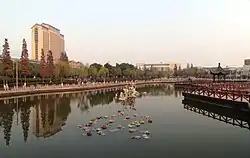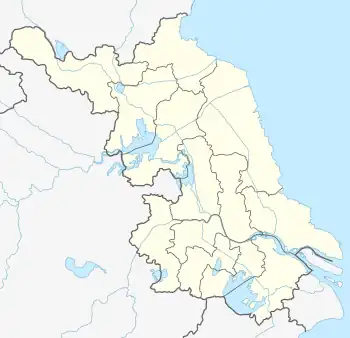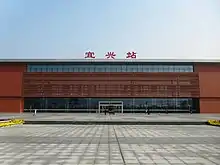Yixing
Yixing (simplified Chinese: 宜兴; traditional Chinese: 宜興; pinyin: Yíxīng) is a county-level city administered under the prefecture-level city of Wuxi in southern Jiangsu province, China, and is part of the Yangtze River Delta. The city is known for its traditional Yixing clay ware tea pots. It is a pene-exclave with Changzhou. The city spans an area of 1,996.6 square kilometres (770.9 sq mi),[1] and has a registered hukou population of about 1,075,800 as of 2020.[2]
Yixing
宜兴市 Ihing | |
|---|---|
 A park in Yixing | |
 Yixing Location within Jiangsu | |
| Coordinates: 31°21′36″N 119°48′54″E | |
| Country | China |
| Province | Jiangsu |
| Prefecture-level city | Wuxi |
| Seat | Yicheng Subdistrict |
| Area | |
| • Total | 1,996.6 km2 (770.9 sq mi) |
| Population (2020) | |
| • Total | 1,075,800 |
| • Density | 540/km2 (1,400/sq mi) |
| Time zone | UTC+8 (China Standard) |
| Postal code | 214200 |
| Area code | 0510 |
| Website | www |
History
.JPG.webp)
During the Xia dynasty and Shang dynasty, the area fell under the jurisdiction of Yangzhou and was known as Jingxi (simplified Chinese: 荆溪; traditional Chinese: 荊溪; pinyin: Jīngxī).[3] The area was subsequently known as Jingyi (simplified Chinese: 荆邑; traditional Chinese: 荊邑; pinyin: Jīngyì) during the Zhou dynasty.[3]
The area was first organized as a county in 221 BCE, during the Qin dynasty, under the name of Yangxian County (simplified Chinese: 阳羡县; traditional Chinese: 陽羨縣; pinyin: Yángxiàn Xiàn).[3] Between 303 and 310 CE, local general Zhou Qi, the eldest son of General Zhou Chu, suppressed three rebellions.[3] Yangxian County was then renamed Yixing Commandery (simplified Chinese: 义兴郡; traditional Chinese: 義興郡; pinyin: Yìxìng Jùn), in honor of Zhou Qi.[3] Yixing Commandery remained under the jurisdiction of Yangzhou.[3] In 589 CE, under the Sui dynasty, Yixing was re-designated from a commandery back to a county, and was placed under the jurisdiction of Changzhou.[3]
In 976 CE, Yixing County (simplified Chinese: 义兴县; traditional Chinese: 義興縣; pinyin: Yìxìng Xiàn) was renamed to the similar sounding Yixing County (simplified Chinese: 宜兴县; traditional Chinese: 宜興縣; pinyin: Yíxìng Xiàn), because of the naming taboo of Emperor Taizong of Song, who went by the personal name of Zhao Guangyi.[3] The renaming perhaps to be the allusion of a sentence in Doctrine of the Mean: "Righteousness is the accordance of actions (義者宜也)". During this time, Yixing County remained under the jurisdiction of Changzhou.[3]
In 1725, under the Qing dynasty, the area was split into two counties: Yixing County (simplified Chinese: 宜兴县; traditional Chinese: 宜興縣; pinyin: Yíxìng Xiàn), and Jingxi County (simplified Chinese: 荆溪县; traditional Chinese: 荊溪縣; pinyin: Jīngxī Xiàn).[3]
In 1912, the Republican government abolished Jingxi County and merged it back into Yixing County.[3]
People's Republic of China
From June 1949 to January 1953, Yixing belonged to Changzhou Prefecture.[3] From January 1953 to February 1956, Yixing belonged to Suzhou Prefecture.[3] Following this, Yixing fell under the jurisdiction of Zhenjiang Prefecture until March 1983.[3] Beginning in March 1983, Yixing County was placed under the jurisdiction of the prefecture-level city of Wuxi, which it remains part of today.[3] In January 1988, Yixing County was abolished, and Yixing was reorganized as a county-level city, which it remains today.[3]
Geography
.jpg.webp)
Yixing's area spans from 31°07′ to 31°37′ north, and from 119°31′ to 120°03′ east.[1] The city is located in the far south of Jiangsu province, lying in between the cities of Shanghai, Nanjing, and Hangzhou.[1] The city is border to the east by Lake Tai, by Changxing County in neighboring Zhejiang province to the southeast, the county-level city of Guangde in neighboring Anhui province to the southwest, the county-level city of Liyang in Changzhou to the west, Jintan District in Changzhou to the northwest, and Wujin District in Changzhou to the north.[1] To its north, situated between Yixing and Wujin District, lies Ge Lake.[1] Yixing's urban area is also rich in lakes, with the San Jiu lake formation, comprising East Lake, West Lake, and Tuan Lake, lying in Yixing's urban core.[1]
Yixing's terrain is higher in the south, and lower in the north.[1] The city's highest point is Huangta Peak (Chinese: 黄塔顶; pinyin: Huángtǎ Dǐng), which rises 611.5 metres (2,006 ft) above sea level.[1]
Environment
In 2020, the city's government recorded an average PM2.5 level of 30.4 micrograms per cubic meter, an 18.9% improvement from 2019.[4] 82.5% of days in Yixing during 2020 had good air quality, as judged per the government.[4]
Climate
| Climate data for Yixing (2005–2020 normals, extremes 1981–2010) | |||||||||||||
|---|---|---|---|---|---|---|---|---|---|---|---|---|---|
| Month | Jan | Feb | Mar | Apr | May | Jun | Jul | Aug | Sep | Oct | Nov | Dec | Year |
| Record high °C (°F) | 21.7 (71.1) |
28.0 (82.4) |
31.5 (88.7) |
34.9 (94.8) |
35.5 (95.9) |
37.5 (99.5) |
39.0 (102.2) |
39.7 (103.5) |
37.3 (99.1) |
32.9 (91.2) |
28.0 (82.4) |
23.4 (74.1) |
39.7 (103.5) |
| Average high °C (°F) | 7.5 (45.5) |
9.8 (49.6) |
15.7 (60.3) |
21.7 (71.1) |
26.6 (79.9) |
29.0 (84.2) |
33.1 (91.6) |
33.0 (91.4) |
28.3 (82.9) |
23.2 (73.8) |
17.1 (62.8) |
10.3 (50.5) |
21.3 (70.3) |
| Daily mean °C (°F) | 3.1 (37.6) |
5.2 (41.4) |
10.2 (50.4) |
16.1 (61.0) |
21.3 (70.3) |
24.7 (76.5) |
28.5 (83.3) |
28.4 (83.1) |
23.7 (74.7) |
17.9 (64.2) |
11.7 (53.1) |
5.0 (41.0) |
16.3 (61.4) |
| Average low °C (°F) | −0.4 (31.3) |
1.5 (34.7) |
5.6 (42.1) |
10.9 (51.6) |
16.7 (62.1) |
21.1 (70.0) |
24.8 (76.6) |
25.0 (77.0) |
20.1 (68.2) |
13.6 (56.5) |
7.4 (45.3) |
0.7 (33.3) |
12.3 (54.1) |
| Record low °C (°F) | −9.5 (14.9) |
−9.2 (15.4) |
−5.0 (23.0) |
0.1 (32.2) |
7.5 (45.5) |
13.1 (55.6) |
18.1 (64.6) |
18.3 (64.9) |
10.6 (51.1) |
2.3 (36.1) |
−4.2 (24.4) |
−9.7 (14.5) |
−9.7 (14.5) |
| Average precipitation mm (inches) | 83.0 (3.27) |
76.7 (3.02) |
104.6 (4.12) |
97.2 (3.83) |
114.3 (4.50) |
225.3 (8.87) |
200.6 (7.90) |
178.1 (7.01) |
114.4 (4.50) |
77.7 (3.06) |
66.4 (2.61) |
53.0 (2.09) |
1,391.3 (54.78) |
| Average precipitation days (≥ 0.1 mm) | 11.2 | 10.8 | 12.8 | 11.8 | 12.0 | 14.1 | 13.5 | 13.2 | 9.9 | 8.3 | 9.9 | 8.5 | 136 |
| Average snowy days | 3.6 | 2.2 | 0.8 | 0 | 0 | 0 | 0 | 0 | 0 | 0 | 0.2 | 0.9 | 7.7 |
| Average relative humidity (%) | 78 | 77 | 75 | 73 | 75 | 81 | 80 | 81 | 80 | 79 | 79 | 76 | 78 |
| Mean monthly sunshine hours | 116.2 | 115.2 | 137.8 | 161.5 | 171.5 | 134.8 | 190.5 | 191.1 | 157.6 | 158.3 | 136.4 | 130.5 | 1,801.4 |
| Percent possible sunshine | 36 | 37 | 37 | 41 | 40 | 32 | 44 | 47 | 43 | 45 | 43 | 42 | 41 |
| Source: China Meteorological Administration[5][6] | |||||||||||||
Administrative divisions
Yixing is divided into 5 subdistricts (Chinese: 街道; pinyin: jiēdào), 14 towns (simplified Chinese: 镇; traditional Chinese: 鎮; pinyin: zhèn), and 2 other township-level divisions.[7] These township-level divisions are then further divided into 102 residential communities (simplified Chinese: 社区; traditional Chinese: 社區; pinyin: shè qū) and 207 administrative villages (Chinese: 行政村; pinyin: xíngzhèng cūn).[2] The city's government is seated in Yicheng Subdistrict.[2]
Subdistricts
Yixing administers the following 5 subdistricts:[7]
Towns
Yixing administers the following 14 towns:[7]
Demographics
.jpg.webp)
As of 2020, the city government estimates Yixing's registered hukou population to be 1,075,800 people.[2] Of this, 529,300 residents are male, and 546,500 are female.[2] The city saw 7,038 births in 2020, giving it a birth rate of 6.53‰ (per thousand), and 9,694 deaths, giving it a death rate of 8.99‰.[2] This gave Yixing a rate of natural increase of -2.46‰ in 2020.[2]
The city is home to 42 different ethnic minorities, who comprise a population of about 15,000 (1.39% of Yixing's total population).[2]
Economy
As of 2020, Yixing has a gross domestic product (GDP) of 183.221 billion renminbi (RMB).[4] This represented a 3% increase from the previous year.[4] The city's per capita disposable income stands as 50,987 RMB, a 5.1% increase from the previous year.[4] This figure stands at 61,090 RMB for urban residents, and 32,430 RMB for rural residents, reflecting a 4.4% and 6.6% increase from the previous year, respectively.[4]
Transportation

The city is served by three railway stations: the Yixing railway station,[8] the Yixing North railway station,[9] and the Dingshan railway station. Yixing railway station is located on the Nanjing–Hangzhou high-speed railway, while the latter two are part of the Xinyi–Changxing railway.
In 2020, the Changyi Expressway (Chinese: 常宜高速), a section of the Jiangyi Expressway linking Yixing to Jiangdu District in Yangzhou, was completed.[4] The same year, the Yichang Expressway (Chinese: 宜长高速), a section of the Hangchangyi Expressway linking Yixing to Changxing County and Hangzhou in neighboring Zhejiang province, was also completed.[4]
Tourist attractions
Dongcang Bridge is a historic stone arch bridge in the city.
Notable people
- Ding Junhui, professional snooker player
- Jiang Fengzhi, musician erhu artist
- Xu Beihong, painter
- the ancestral home of Chiang Kai-shek
References
- 地理位置 [Geographic Location]. www.yixing.gov.cn (in Chinese). Yixing Municipal People's Government. 2021-08-25. Archived from the original on 2021-10-30. Retrieved 2021-10-30.
- 区划人口 [Divisions and Population]. www.yixing.gov.cn (in Chinese). Yixing Municipal People's Government. 2021-08-25. Archived from the original on 2021-10-30. Retrieved 2021-10-30.
- 建置沿革 [Organizational History]. www.yixing.gov.cn (in Chinese). Yixing Municipal People's Government. 2021-08-25. Archived from the original on 2021-10-30. Retrieved 2021-10-30.
- 经济社会发展 [Economic and Social Development]. www.yixing.gov.cn (in Chinese). Yixing Municipal People's Government. 2021-08-25. Archived from the original on 2021-10-30. Retrieved 2021-10-30.
- 中国气象数据网 – WeatherBk Data (in Simplified Chinese). China Meteorological Administration. Retrieved 25 June 2023.
- 中国气象数据网 (in Simplified Chinese). China Meteorological Administration. Retrieved 25 June 2023.
- 2020年统计用区划代码(宜兴市) [2020 Statistical Division Codes (Yixing)] (in Chinese). National Bureau of Statistics of China. 2020. Archived from the original on 2021-10-30. Retrieved 2021-10-30.
- 从太湖到西湖 宁杭高铁将刷新中国经济发展版图 [From Lake Tai to West Lake, Nanjing-Hangzhou high-speed rail will refresh China's economic development map] (in Chinese). State Council of the People's Republic of China. 2013-06-30. Archived from the original on 2021-10-30. Retrieved 2021-10-30.
- Sun, Yeguo; Zhu, Mingxuan (2021-05-07). 白货稳占“半壁江山”的背后 [White goods are firmly behind the "half of the country"]. People's Railway (in Chinese). China Railway. Archived from the original on 2021-10-30. Retrieved 2021-10-30.
External links
- Yixing Municipal Government website (In Simplified Chinese characters)